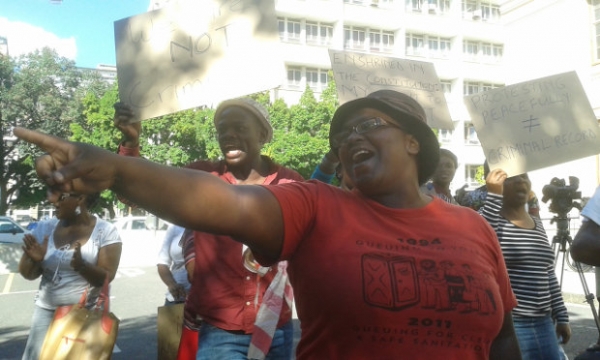

Activists with the SJC picketed outside the Cape Town Magistrates Court on Friday in anticipation of judgment in the case of 21 of the organisation’s members on trial for participating in an illegal gathering. Photo by Daneel Knoetze.
6 February 2015
SJC activists and their supporters descended upon the Cape Town Magistrates’ court this morning, anticipating judgment in a trial that has been ongoing, in stops and starts, since July last year. But there was to be no judgment, because part of the court record had been lost.
The activists have been on trial for attending and convening an “illegal gathering” in 2013.
Outside the court their supporters toyi-toyed, while holding placards and singing protest songs.
Lawyer for the accused, Steve Kahanovitz of the Legal Resources Centre, explained that part of the court record, a section of SJC general secretary Phumeza Mlungwana’s testimony, had been lost. “The magistrate informed us this morning and requested that Ms Mlungwana be recalled to the stand to give clarity [on the section of the testimony that was lost],” he said.
Mlungwana was questioned, for a second time, on the exact number of people who had participated in a picket outside Mayor Patricia de Lille’s office on 11 September 2013. Some of the 21 accused had chained themselves to the railings, others had gathered in support of the picket. The protest was against what the SJC says was the City of Cape Town’s poor implementation of janitorial services introduced to clean flush toilets in informal settlements.
De Lille did not meet the protesters and some of the activists, 21 in total, were arrested later that day. They were charged and tried under the Regulations of Gatherings Act, which requires that groups larger than 15 give notice before gathering in a public space.
Although the SJC admits to not having given notice, the group has argued throughout the trial that the legislation under which they are being tried is unconstitutional because it curtails the right (enshrined in Section 17 of the Constitution) to peaceful assembly and protest.
“The existence of such a severe limitation will inevitably prevent people from engaging in legitimate forms of protest. While the police may not always strictly enforce the law in the manner they did in this case, the existence of the law will have a chilling effect on protest because people will be concerned that they will be arrested,” wrote the SJC in a statement published in anticipation of the judgment.
The magistrate cannot rule on the constitutionality of the legislation, and would have to hand down judgment in line with the Act. If the activists are convicted, the SJC has indicated that it would appeal the judgment in the Western Cape High Court on constitutional grounds. After questioning Mlungwana, Magistrate Fredericks postponed the case until Wednesday next week, when judgment is expected.
“It is sad that the court system is so inefficient,” said Zackie Achmat, an SJC member and one of the accused. “It is a waste of time for the state and for the accused who lose out on work days every time they are recalled.”